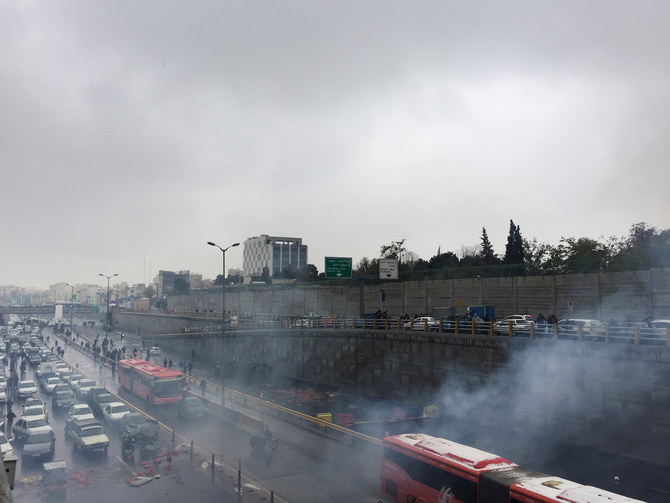TEHRAN: Protesters angered by Iran raising government-set gasoline prices by 50 percent blocked traffic in major cities and occasionally clashed with police on Saturday after a night of demonstrations punctuated by gunfire, in violence that reportedly killed at least one person.
The death occurred in the central city of Sirjan, where people tried to set fire to a fuel depot but were thwarted by security forces including police, the Revolutionary Guards and Basij militia, the semi-official ISNA news agency reported.
The protests put renewed pressure on Iran’s government as it struggles to overcome the US sanctions strangling the country after President Donald Trump unilaterally withdrew America from Tehran’s nuclear deal with world powers.
Though largely peaceful, demonstrations devolved into violence in several instances, with online videos purporting to show police officers firing tear gas at protesters and mobs setting fires.
Dr. Majid Rafizadeh, a Harvard educated Iranian-American political scientist, told Arab News that the Islamic Republic appears to be scrambling to compensate for the loss of revenues that it is encountering due to a major decline in the regime’s oil exports. “US sanctions on the country have exerted significant pressure on the ruling clerics.”
He said: “Tehran is desperate to generate revenue, in order to fund its military interests in the wider region and support its proxies everywhere from Yemen to Lebanon.
“It is important to point out that the current protests in Iran are expression of broad frustration with the clerical regime. While representing a political risk for President Hassan Rouhani ahead of February parliamentary elections, it also shows the widespread anger among Iran’s 80 million people who have seen their savings evaporate amid scarce jobs and the national rial currency’s collapse.
Opinion
This section contains relevant reference points, placed in (Opinion field)
The demonstrations took place in over a dozen cities in the hours following Rouhani’s decision at midnight Friday to cut gasoline subsidies to fund handouts for Iran’s poor.
Gasoline in the country still remains among the cheapest in the world, with the new prices jumping up to a minimum of 15,000 rials per liter of gas — 50 percent up from the day before. That’s 13 cents a liter, or about 50 cents a gallon. A gallon of regular gasoline in the US costs $2.60 by comparison.
Iran imposed petrol rationing and raised pump prices by at least 50 percent on Friday, saying the move was aimed at helping citizens in need with cash handouts.
President Hassan Rouhani said on Saturday that currently 75 percent of Iranians were “under pressure” and the extra revenues from the petrol price hike would go to them, and not the treasury.
Rouhani had tried to hike fuel prices in December but was blocked by parliament in the wake of protests that rocked Iran for days.The speaker at the time ruled out the move as unpopular and said it was “not in the interests of the country.”
The rationing and price hike come at a sensitive time as Iran prepares for a parliamentary election in February.
The measure was expected to bring in $2.55 billion per annum, the head of the country’s Planning and Budget Organization, Mohammad Bagher Nobakht, said on state television.
About 60 million Iranians in need would get payments ranging from $4.68 for couples to slightly more than $17.46 for families with five members or more, he said.
Under the scheme, drivers with fuel cards will pay 13 US cents a liter for the first 60 liters of petrol bought each month, with each additional liter costing them 71 US cents.
But in a nation where many get by as informal taxi drivers, cheap gasoline is considered a birthright. Iran is home to the world’s fourth-largest crude oil reserves. While expected for months, the decision still caught many by surprise and sparked immediate demonstrations overnight.
As I said to the people of Iran almost a year and a half ago: The United States is with you. https://t.co/D972wPyLxm
— Secretary Pompeo (@SecPompeo) November 16, 2019
Violence broke out Friday night in Sirjan, a city some 800 km southeast of Tehran. The state-run IRNA news agency said “protesters tried to set fire to the oil depot, but they were stopped by police.”
It did not elaborate, but online videos circulating on Iranian social media purported to show a fire at the depot as sirens wailed in the background. Another showed a large crowd shouting: “Rouhani, shame on you! Leave the country alone!”
Mohammad Mahmoudabadi, an Interior Ministry official in Sirjan, later told state television that police and demonstrators exchanged gunfire, wounding several.
It was a “calm gathering” that was exploited by some who “destroyed public property, damaged fuel stations and also wanted to access the oil company’s main fuel depots and set fire to them,” he said.
Besides Sirjan, “scattered” protests were also held on Friday in other cities including Abadan, Ahvaz, Bandar Abbas, Birjand, Gachsaran, Khoramshahr, Mahshahr, Mashhad and Shiraz, state news agency IRNA said.
But they were mostly limited to blocking traffic and were over by midnight, IRNA reported.
Fresh demonstrations were held on Saturday in the cities of Doroud, Garmsar, Gorgan, Ilam, Karaj, Khoramabad, Mehdishahr, Qazvin, Qom, Sanandaj, Shahroud and Shiraz, IRNA said.
“Some drivers have protested the new petrol price by turning off their cars and creating traffic jams,” the official news agency added.





















